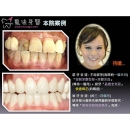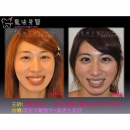-
 Name: Periodontal Surgery
Name: Periodontal Surgery
Model: Periodontal Disease Treatment-3 -
 Name: Full Porcelain Crown
Name: Full Porcelain Crown
Model: Dental Prosthodontics-3 -
 Name: Teeth Whitening Laser
Name: Teeth Whitening Laser
Model: Dental Esthetics-4 -
 Name: Gingival Surgery
Name: Gingival Surgery
Model: Full Mouth Reconstruction-3

Dental Implant
technology, and you can also choose Target-controlled infusion(TCI) for tooth implanting. Being passionate, professional, and treating our clients as our closest family members, we wish you all can have the idealest curing result! This makes our dental clinic different from others.We are one of the eminent manufacturers, suppliers and exporters of Dental Implant. The products offered by us have numerous applications like offering support for partial denture, replacing tooth/teeth, enhance chewing comfort and enhance stability & support of lower & full upper denture. The treatment is carried out in a sterilized environment taking aseptic and sterilization under consideration. The success rate is incredibly high. It is placed under local anesthesia by our implant surgeons, and is then allowed to heal and integrate with the bone. We are offering our clients an extensive range of Dental Implant that is widely recommended by dentists worldwide for patients with missing teeth. In our advanced infrastructure with latest equipment, we provide type natural-looking teeth replacements for single or multiple teeth missing situations. Once fitted, Implants are as secure as a natural tooth. Implants can replace individual teeth and partial bridges in the upper and lower jaws. They are a boon to the patients with ill-fitted and sliding lower dentures. It has a clear advantage over conventional crown and bridges, in the sense that they do not rely on the neighboring tooth for support and hence the healthy neighboring teeth are not prepared by dental drill.
Post-extraction Care Instructions
1. Bite down on gauze pack for 30 minutes and refrain from spitting out blood. Please swallow all saliva in order to prevent displacement of gauze pack. Keeping gauze pack in place can help stop bleeding.
2. Remove gauze pack 30 minutes later. Do not fret over mild oozing of wound since this is considered normal. Do not spit out blood even after removal of gauze pack since spitting may cause wound to bleed again.
3. Analgesics, painkillers, can be taken immediately after the removal of gauze pack; however, do not intake any food until numbness feeling from the anesthetics wears off. This is to prevent accidental biting trauma of the lips and tongue.
4. Do not eat extremely hot, hard, or spicy foods for 7 days following the operation. A cold and soft diet (e.g. milk, cold porridge, cake, and ice cream) is preferred. Also, avoid all use of straws.
5. In order to maintain the hygiene of the operation site, gently rinse mouth with warm salt water or mouthwash after eating. Brush teeth with caution to prevent contact with wound and do not rinse mouth or spit with excessive force.
6. Painful swelling of the operation area may be more apparent two days after the operation. Use ice pack to reduce symptoms and prevent bleeding.
7. Please return to the hospital one week after the operation for the check-up of the wound condition and removal of the dressing and sutures.
8. Return to the hospital in 3 ~ 4 weeks for further evaluation of the healing condition and subsequent prosthetic rehabilitation, wisdom teeth excluded.
Post-Operative Instructions in Caldwell and Florham Park, NJ
It is our goal that your recovery be as smooth and comfortable as possible. By carefully following these instruction you will minimize any pain and swelling and lessen the chance for infection and complications.
Please read these instructions carefully before calling the office. If after reading these directions you have any questions.Call the clinic and our doctor will be happy to speak with you.
FIRST HOUR
• PAIN MEDICATION – If instructed by your surgeon, you should take over-the-counter Motrin or Advil, 2 tablets every 6 hours continuously for the first two days. The active generic ingredient is ibuprofen and you may find the store brand equally effective and less expensive. Take the first dose immediately and before the local anesthesia has worn off. You may use the prescription medication on top of and in-addition-to the Motrin/Advil tablets as needed.
• GAUZE PRESSURE – Bite down firmly on the gauze packs that have been placed over the surgical areas, make sure they remain in place. Do not change them for the first 30 minutes unless the bleeding is heavy. After 30 minutes, place enough new gauze to obtain pressure over the surgical site for another 30 minutes. The gauze may then be changed as necessary (typically every 20 to 30 minutes). It is best to slightly moisten the gauze with tap water and loosely fluff for more comfortable positioning. Bleeding from oral surgery may take 24 hours to fully stop. Read below.
• PROTECTING THE BLOOD CLOT – Do not rinse, smoke, or drink with a straw for at least 48 hours after your surgery. If you have been prescribed an antibiotic mouthwash, you may begin to use it gently at bedtime the night of your surgery.
The chemicals in cigarettes are caustic and will significantly delay healing, increase post-operative pain, swelling, risk of infection, and dry socket.
• ICE PACKS – Swelling is common following oral surgery. Swelling can be minimized by using cold packs, or a bag of frozen peas applied firmly to the cheek nearest to the surgical area. This should be applied twenty minutes on and twenty minutes off during the first 24 hours after surgery. Do not use any ice after the first 48 hours.
• PROBIOTICS may prevent and relieve some of the common side effects of antibiotics such as nausea, stomach upset, and diarrhea. Probiotics are considered safe and are naturally contained in products such as yogurt. We recommend taking PROBIOTICS while you are taking antibiotics we prescribe for you. Probiotics come in several forms and can be obtained over-the-counter at your local pharmacy or supermarket. It is important that you notify your doctor if you experience side effects as they may also be a sign of other serious conditions that may require medical attention.
AFTER THE FIRST HOUR
• PERSISTENT BLEEDING – Mild bleeding or oozing is normal during the first 24 hours. If necessary reposition the gauze packs directly over the surgical site. If bleeding persists or becomes heavy you may substitute a tea bag (soaked in very hot water, squeezed damp-dry and wrapped in a moist gauze) for 20 or 30 minutes. The tea contains a beneficial chemical that locally constricts blood vessels. If bleeding remains uncontrolled after a full hour of using the tea bags, call our office. Remove the gauze while you eat and sleep. Place an old towel over your pillow, as one drop of blood will turn a mouth full of saliva red. It is completely normal to experience mild oozing of blood from the surgical area for a full 24 hrs. Once the bleeding has stopped you do not have to use anymore gauze.
• STEROIDS – If you have been prescribed medicine to minimize swelling, be sure to take as directed on the box. You should take the first group of day 1 pills all together at bedtime tonight.
• MOUTH OPENING EXERCISES – Jaw stiffness is common following oral surgery. You can reduce this stiffness by stretching your mouth open with two fingers each hour.
• MANAGING POST-OPERATIVE PAIN – Unfortunately, most oral surgery is accompanied by some degree of discomfort and you may be given a prescription for pain medication. To best manage your discomfort, you should take the first pill before the numbness has worn off. If you find you are taking large amounts of pain medicine at frequent intervals, please call our clinic. You must call for a refill during normal weekday business hours, if you anticipate needing more pain medication for the weekend.
• NAUSEA – Nausea can occur after anesthesia or surgery. It generally improves within 4-6 hours. Nausea following anesthesia is best managed by avoiding all foods until you are feeling hungry. Try sipping small amounts of clear liquids to prevent dehydration. If the pain medication is the cause, try taking Maalox immediately before the medication and drink plenty of water. Try to keep taking clear fluids and minimize dosing of pain medications, but call us if you do not feel better.
• PAIN MEDICATION PRECAUTIONS – The prescription pain medication given to you by the doctor may cause drowsiness, decreased reaction time, blurred vision and change in mental status. Do not drive, operate dangerous machinery, make important decisions or perform strenuous exercises while taking these medications. Failure to follow these instructions increases your risk of causing injury to yourself and others.
POST-OP DAY #2 AND BEYOND
• ORAL HYGIENE – Keeping your mouth clean after surgery is essential. In addition to any prescription mouthwashes you may have been given, you may use 1/4 teaspoon of salt dissolved in an 8 ounce glass of warm water and gently rinse with portions of the solution, taking five minutes to use the entire glassful. Repeat as often as you like, but at least twice a day. Avoid commercial mouthwashes, the alcohol they contain may irritate the surgical site. Please exercise caution when brushing around the surgical site by doing so very gently for the first two weeks. We do encourage you to brush and floss all other areas as you normally would. Good oral hygiene is key to a healthy surgical site.
• HEALING – Normal healing after tooth extraction should be as follows: The first three days after surgery are generally the most uncomfortable and there is usually some swelling. On the 4th day you should be more comfortable and, although still swollen, can usually begin a more normal diet. The remainder of the post-operative course should be a gradual, steady improvement. If you do not see continued improvement, please call our office.
• DRY SOCKET – A dry socket is a painful condition that results from premature loss of the blood clot. Risk factors for developing a dry socket are extracting painful or infected teeth, wisdom tooth surgery, females, smokers, and oral contraceptives. Symptoms of a dry socket typically occur on the 3rd or 4th post-operative day. Severe throbbing pain, which is not responsive to pain medications and bad breath, are the usual complaints. This condition requires an office visit where your surgeon will gently place a medicated dressing into the tooth socket. Pain relief is often immediate once the site is treated. A few visits may be necessary in some cases.
• SHARP EDGES/SUTURES – If you feel something hard or sharp edges around the surgical areas, it is likely you are feeling the bony walls, which once supported the extracted teeth or the ends of the sutures. Occasionally small slivers of bone may work themselves out during the following weeks. This is normal but if they cause concern or discomfort, please call the office. Dissolvable stitches begin to melt away as you heal. Loose ends may be cut short with a clean sharp scissors or gently pulled.
Following these instructions will assist you, but if you have questions about your progress, please call the office. Contact our clinic using What App, Line, We chat, will result in a faster response to your question or concern.




